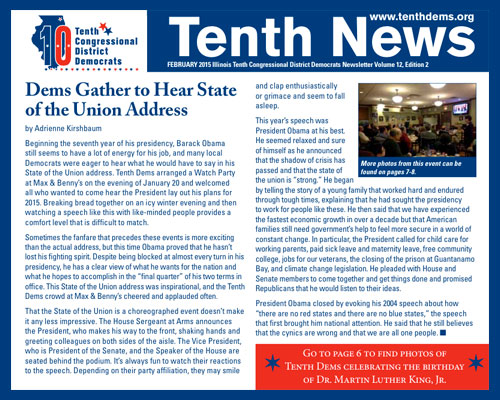
Tenth Dems February Newsletter
Please follow the link to view our February newsletter as a pdf file:
https://tenthdems.org/wp/wp-content/uploads/2015/01/201502NL.pdf
In this issue of Tenth News:
Read More »
When: Wednesday, February 25, 2015 from 7:00 – 8:30 pm
Where: Deerfield Public Library, 920 Waukegan Rd., Deerfield
What: State Senator Julie Morrison invites you to come to her listening tour and weigh in on the important issues facing the General Assembly in 2015. Tell her what matters to you and your community.
The Deerfield Public Library provides meeting space as a community service. Neither the Library nor the Board sponsors or endorses these events or the presenting of individuals or organizations.
When: Wednesday, February 11, 2015. Honorees Reception 5:30 pm, General Reception 6:30
Where: City Winery, 1200 W. Randolph St., Chicago
What: Common Cause Illinois invites you to their 2015 Champions of Democracy Awards Gala honoring Lawrence Lessig, Alderman Joe Moore, Amalia Rioja, Esq., Joakim Noah and Cecilia Rodhe. Music, hors d’oeuvres, open bar, awards and silent auction. Master of ceremonies Steve Edwards.
RSVP online. General admission $175, sponsor levels available. Valet parking $10.
When: Tuesday, February 3, 2015 from 5:00 – 7:00 pm
Where: Waukegan Yacht Club, 199 N. Harbor Pl., Waukegan
What: Waukegan Township and partners invite you to the 2nd Annual Artis Yancey Historically Black and University Tour. Secretary of State Jesse White is the scheduled keynote speaker.
Tickets are $50. RSVP on Facebook, or for questions, send an email or call 847-244-9242.


